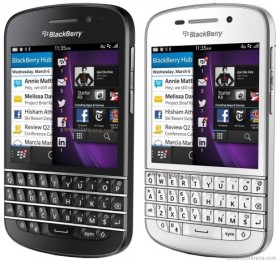BlackBerry Posts Huge Loss, To Cut 4500 Staff
 On Friday [Sept 20], BlackBerry announced that it would lay off 4,500 employees — nearly 40% of its workforce — and also posted a loss of nearly $1 billion.
On Friday [Sept 20], BlackBerry announced that it would lay off 4,500 employees — nearly 40% of its workforce — and also posted a loss of nearly $1 billion.
Once the dominant smartphone in Bermuda and around the world, BlackBerry has been hammered by the Apple iPhone and Android-based rivals like Samsung in recent years.
This year’s launch of BlackBerry 10, its revamped operating system, and fancier new devices such as the touchscreen Z10, were designed to rejuvenate the brand, however sales fell well under expectations.
Worldwide sales of BlackBerry phones during the second quarter totaled 3.7 million, while Apple sold 31.2 million iPhones during its last quarter.
The Canadian company once had close to 20,000 employees, went through a first round of job cuts, and now plans to further reduce staff to approximately 7,000.
BlackBerry has hired accounting firm PricewaterhouseCoopers LLP to evaluate the company for potential buyers, according to a report from Bloomberg.
A New York Times report said the “cut is so deep some analysts and investors said that the company’s days as a smartphone maker were effectively over.”
BlackBerry’s full financial results are below:
BlackBerry Limited, a world leader in the mobile communications market, today announced certain preliminary financial results for the three months ended August 31, 2013 and provided an update on business operations.
Preliminary Second Quarter Fiscal 2014 Results
The Company currently expects to report revenue for the second quarter of approximately $1.6 billion, of which approximately 50% is expected to be service revenue. For the second quarter, the Company expects to recognize hardware revenue on approximately 3.7 million BlackBerry smartphones. Most of the units recognized are BlackBerry 7 devices, in part because certain BlackBerry 10 devices that were shipped in the quarter will not be recognized until those devices are sold through to end customers. During the second quarter, approximately 5.9 million BlackBerry smartphones were sold through to end customers, which included shipments made prior to the second quarter and which reduced the Company’s inventory in channel.
As a consequence of the more intense competition the Company is experiencing in its hardware business, it expects to report a primarily non-cash, pre-tax charge against inventory and supply commitments in the second quarter of approximately $930 million to $960 million, which is primarily attributable to BlackBerry Z10 devices.
The current quarter will also include a pre-tax restructuring charge in the approximate amount of $72 million reflecting ongoing cost efficiency initiatives.
As previously disclosed, the Company anticipated generating an operating loss in the second quarter. The Company currently expects that its adjusted net loss, before giving effect to the inventory and restructuring provisions referred to above, will be in a range of approximately $250 million to $265 million, or $0.47 to $0.51 per diluted share. Including the inventory and restructuring provisions, the GAAP net loss is expected to be approximately $950 million to $995 million, or $1.81 to $1.90 per share. Adjusted gross margin is expected to be approximately 35-37 percent.
At the end of the second quarter, total cash, cash equivalents and investments is estimated to be approximately $2.6 billion. The Company has no debt.
The preliminary, unaudited information provided above is based on the Company’s current estimate of results from operations for the second quarter of Fiscal 2014 and remains subject to change based on the Company’s ongoing review of results, the subsequent occurrence or identification of events prior to closing of the review and any further adjustments made in connection with closing and review procedures. All figures in this release are in U.S. dollars and U.S. GAAP, except where otherwise indicated.
Operational Restructuring Designed to Enhance Financial Results
As part of the Company’s focus on enhancing its financial results, and in response to the increasing competition in the smartphone market, BlackBerry also announced plans to transition its future smartphone portfolio from six devices to four. The portfolio will focus on enterprise and prosumer-centric targeted devices, including 2 high-end devices and 2 entry-level devices in all-touch and QWERTY models. With the launch of the BlackBerry Z30 – the next generation high-tier smartphone built on the BlackBerry 10 platform — this week, the Company will re-tier the BlackBerry Z10 smartphone to make it available to a broader, entry-level audience. At the same time, the Special Committee of the Company’s Board of Directors continues to evaluate all strategic alternatives for the Company.
Furthermore, the Company also announced that it is targeting an approximate 50% reduction in operating expenditures by the end of the first quarter of Fiscal 2015. As part of this, BlackBerry will implement a workforce reduction of approximately 4,500 positions or approximately 40% of the Company’s global workforce resulting in a total workforce of approximately 7,000 full-time global employees.
Thorsten Heins, President and Chief Executive Officer of BlackBerry said, “We are implementing the difficult, but necessary operational changes announced today to address our position in a maturing and more competitive industry, and to drive the company toward profitability. Going forward, we plan to refocus our offering on our end-to-end solution of hardware, software and services for enterprises and the productive, professional end user. This puts us squarely on target with the customers that helped build BlackBerry into the leading brand today for enterprise security, manageability and reliability.”
The Company continues to see increasing penetration of BES 10 with more than 25,000 commercial and test servers installed to date, compared to 19,000 in July 2013.
“Our enterprise business continues to reflect the trust that governments and businesses have placed in the BlackBerry platform,” added Heins. “Security matters and enterprises know the gold standard in enterprise mobility is BlackBerry.”
-
Read More About
Category: All, technology

